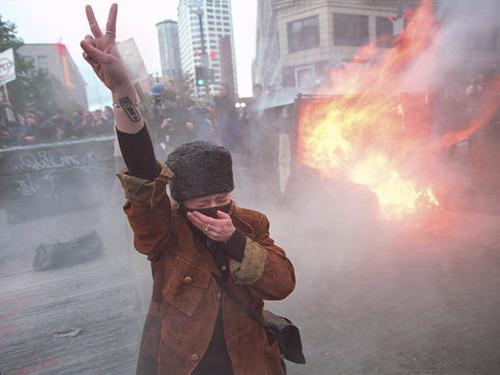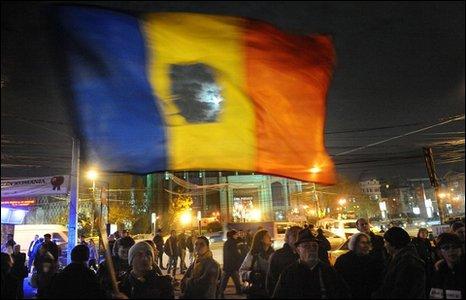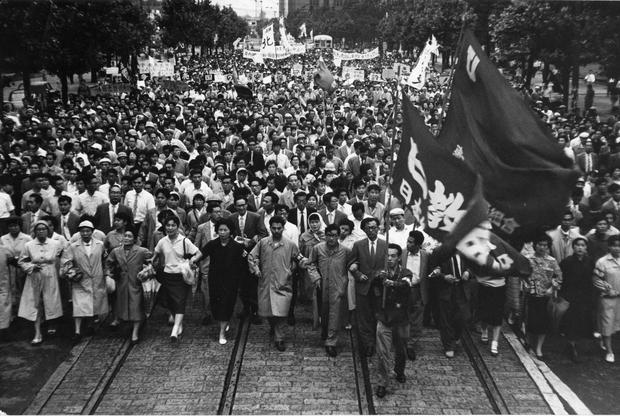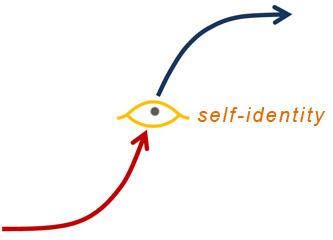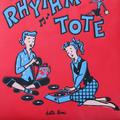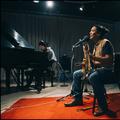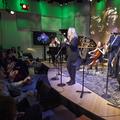Do you have a photo of your revolution? Is there an image that captures your movement, or an image of a revolutionary you?!
Claire
St. Louis
Other/Almost
My grandpa was in the Hungarian Revolution of 1956. He was at the Parliament building protest when the Soviets started shooting, he was issued a rifle by the other revolutionaries, and his ambulance full of patients from his clinic was almost blown up by a Soviet tank in a Mexican standoff.
The Hungarian Freedom only lasted 2 weeks before it was crushed, but it proved to the world that the Soviets could be stopped.
However, what he has taught me from it is that I should appreciate my life here in the US, never take anything for granted, how to make some delicious Hungarian food, and our problems here really aren't that bad. He also taught me from his experience as a refugee that if I ever move to another country, that I should just let go of my American culture or else I'll hate the new country.
Franciele
New Jersey
Other/Almost
Brazil/ 1984-1990
I was born in Brazil in 1983.
My memories are more about what happened after revolution, and I remember there was mess, political and economical instability. However, when in high school my parents and teachers saying " you're learning things that we're not allowed to learn, we're learning with you" and it's very important to remember. During dictatorship there is brainwashing and its difficult to the people pick it up the pieces after. There will be difficult times, the Egyptians will have to learn how to run the Country. But there is nothing better than freedom. It takes time but it's worth it.
Parsa S. Sajid
New York, NY
Other/Almost
I am from Bangladesh and I wanted to call attention to two revolutions/uprisings in the country's short history. First was in 1971 when we broke free from Pakistan. Second in 1990 when the people overthrew a military dictator.
1971 was before I was born and I was a too young in 1990 to actively participate, but I still have vivid memories from 1990. 1990 was before I moved to the US and first hand experience from leaving under martial law/curfew to overthrew of military dictatorship and knew people who incredible risks to organize and participate.
Given US role in the 1971 war, I would have hope you'd highlight that in your show.
There are so many pictures from these events that I don't know what to upload and what to leave out.
Lessons:
Role of social media: Both of these revolutions/uprising were before the advent of social media. Not to undermine the role of social media in Egyptian/Tunisian revolutions (I know Twitter has helped me to keep up to date and has been immensely helpful), but unjust regimes can be overthrown by a critical mass of people once fear can be overcome.
Post-revolution: If we can draw any lessons from Bangladesh, governing a just society can be just as difficult. Post-1990, we have had democracy but not democratic institutions. We are getting there and I wouldn't trade democracy for anything but it can be a long, hard road to establish democratic institutions.
Mana
Suffolk county
Iran 1979
In 78 and 79, in the middle of it, literally. Formative event of my life.
I think in a sense, the Egyptians and the American Government have learnt a lot of lessons from that revolution. It has become a cautionary tale (sadly for us). There is no dogma in this revolution, no raw emotional zenophobia. There are no god-like leaders, with powers of fiat. US government is no Carter, with his 'Island of Stability' comments that fanned flames. Iranisn rev turned out very violent, before and after. Egyptians should avoid that at the expense of speed. They have already achieved in 17 days what it took us eighteen months to accomplish. BBC back then is horse carriage compared to AlJazeera and CNN streaming over the internet. This is a populace that has overgrown its archaic governing structures, change is inevitable. In Iran, it was the culmination of years of humiliating neocolonial dominance. Egyptians got over that, in a sense, by Nasser and Nasserism. Iranians were finishing a job, in a sense, started by Mossadeq's anti-British movement. This is a start of something new in Egypt. So very different settings, although the arc of events feels very familiar (on fast-forward).
Josh Levine
NYC area
Out of curiosity, I co-founded a magazine about Vietnam, from New York, while we were still technically at war with the country, in 1994. This was just after the national currency was literally based on rice. Among other things, I wanted to watch the country's transition toward Capitalism. The country grew on me quickly and I continue to root for it and believe in the people there, all the more for having gotten to know them over several years in Hanoi.
I showed up looking to debate Communists. One day several years later, interviewing a top land official about the ridiculous irony that land was the country's only free market -- yet was technically owned "by the people" -- came my moment of deep insight. After literally a three hour interview with this top Communist official who, like most top officials served in the "American War," he admitted, "we are just army men. We are just trying to hold the country together until our smart children can figure this mess out." This was twenty five years after the fighting stopped and around ten years ago, now. Their kids are just starting to take over -- I'm sure the army monopolies continue to be tempting, especially to their kids, some of whom are Harvard MBAs! Anyway, in this case, it's been over half a century since Vietnam broke the millennium- long grip foreigners held on its sovereignty. Ironically, its path to prosperity is based on foreign investors, who are attracted to its the very sovereignty it fought so hard to win -- Vietnam's strongest card is that it is NOT China.
The only lesson I see for Egypt is to try and imagine the scenarios under which the Army will give up the industries it runs. Vietnam had Jeffrey Sachs repeating his USSR lecture series on trusting the Free Market but Egypt won't even have this. Breaking monopolies could be harder than breaking the grip of a single old king -- especially when Capitalism and Democracy are not squeezed into the same box.
Joseph T Barna
Jersey City, NJ
Other/Almost
In 1989 in Soviet Georgia a protest on the city hall steps of Tbilisi resulted in many deaths at the hands of the Soviet Army and KGB. In April 1990, on the anniversary, I happened to be in Tbilisi with the Yale Russian Chorus. The Georgian leaders were having a hunger strike on the steps, and we got to sit with them for an hour while they told their stories and we sang to them. (The American songs brought tears and clenched fists from the crowd.) I recorded the interview, translated by our guide. The most amazing comment was "Do not be mistaken. We all agree that the Russians must go. But once they are gone we do not agree and will be at each other's throats." (That is how things turned out.)
The next night, I went out to take pictures of neon signs, and found hundreds of people streaming down the main street. I joined them and found the crowd occupying Lenin Square for the first time in history. (This is where GW Bush had a hand grenade thrown at him, as "Independence Square.") When the leaders saw me, they had someone drive me back to the hotel to get the rest of my equipment to record and be a witness. I was the only westerner in the square. When I took my first picture (with flash, it was night) the Georgians crowded around me thinking I was KGB, but the leaders told them I was American and on their side. Of course, the KGB saw the flash and I didn't know if they would come after me. They sang revolutionary songs for me, showed me Georgian passports from their brief independence in the 1920s, and sat talking with me below Lenin's statue. I snuck out shortly before the troops moved in. On my balcony at the hotel I recorded my thoughts, that it was like being at Concord or Lexington.
No one was killed, but the leaders were arrested. The next day I spent four hours with the crowd outside KGB headquarters as the crowd waited for them to be released, one by one. They all came up to me and thanked me.
The lesson? The people, once started, cannot be stopped. But it is their country. They may not settle things peaceably, but it is their right to settle things and there is little we can do unless we wish to be dictators also.
I'm sorry that after two years of being homeless my stuff is mostly in storage so I cannot share the recordings with you. If someone from WNYC would love an oral history project, they should talk to me. Joe 732 754 9294
josephtbarna@yahoo.com
I included the lessons above. (I hadn't scrolled down to realize there was a separate box. Sorry.
I have images and sound, as I say, but they are in storage somewhere at present, so I have not uploaded anything.
Jennifer Wilson
New Jersey
Other/Almost
I was studying in St. Petersburg, Russia (then Leningrad) in August of 1991, having just celebrated my 19th Birthday singing Beatles songs with my new Russian and other expat friends when the Soviet Coup D'etat attempt broke out. I was living with a Russian family in a former communal apartment building in downtown Leningrad only a few blocks from the Winter Palace and Nevsky Prospect. I had just returned from spending the weekend in Moscow, where there were no visible signs of unrest. We took the overnight train back to St. Petersburg to learn that the Coup had broken out overnight. My Russian host family invited me into their room, which they had never done before, to watch the news. We were told the old Soviet line that Gorbachev was sick and was taken to the south for recovery, that there were tanks and soldiers in Red Square and that demonstrations were being organized for the Palace Square. The news also reported that the airports were closed and that the phone lines were down. There was no way to get out of the country. My host family told me that I should go to the U.S. Consulate. The subways were still working, even though there was a workers strike, so I went to my language school and found some other students there. I was frightened and exhilarated at the same time. We took a cab to the Consulate to register. I had never felt so patriotic in my life at the sight of that oversized American flag billowing in the wind outside of the Consulate. Inside, the soldiers acted as if nothing was happening outside and simply gave us registration forms to fill out and we were told not to leave the city. We were very matter-of-factly told that the government would get us out if they needed to. This was reassuring, but disappointing. I had somehow expected to be greeted with open arms, enveloped like a child into the strong arms of America, offered a cold diet coke and an open line to call home to my mother, who was certainly worried to death. That didn't happen. I think I grew up a lot in those few minutes.
I was young and naive. I had never been outside of the U.S. before and my understanding of revolution came from my AP American History class. But within the course of 24-48 hours I understood why people rise up. The Russian soul had been beaten down for centuries and you could see it in their faces, in their demeanor, and in their resignation to trudge through daily life without complaint and, moreover, without any great expectation of happiness. Russians were tough, they had proven that they could endure anything and survive, but they had had enough. And there I was marching along side of them, chanting with them, taking a stand against the Soviets and finding my own inner strength along the way.
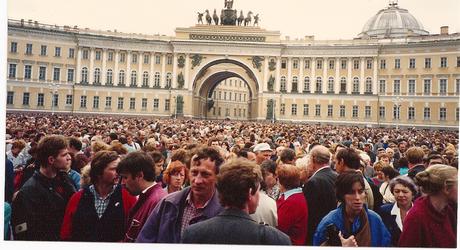
Benedict Arnold
St. Mary's Church, Battersea
Other/Almost
I was a leading figure in the early success of the American colonies' effort to throw off the yoke of England. Unfortunately, my efforts and sacrifice were not appreciated by my peers and so I took my unique skills 'over the hill', as it were.
I suggest you choose your side wisely. Not that I'm bitter or anything.
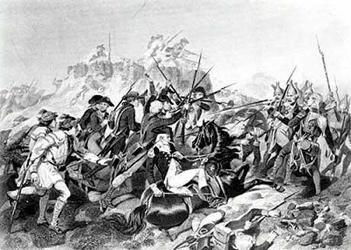
Sheila Michaels
New York
Other/Almost
I was in the Civil Rights Movement from 1961-64, in the Deep South & in the North, with both SNCC & CORE.
I was in Laos in 1975, working with the Terre des Hommes teenage Vietnamese paraplegic orphans who were airlifted into
Laos by their caregivers, but who the organization ordered returned to Vietnam. I was recruited in an ice cream shop & stayed with the kids a couple of months while the arrangements were made. Only one of the children is still alive. By the time the children were evacuated,the Pathet Lao had completely replaced the Royal Lao government. . After the children left, I traveled to Luang Prabang, when travel was permitted.
I am so pleased to see the world being shown that nonviolent direct action can overthrow a violent force. I can only hope it will continue.
Charles Gordanier
NYC
Iran 1979
I was an American 12-13 year old living in Tehran, my father worked worked for AT&T International. A few of many memories:
) the revolution built slowly and only got hot in the fall of 1978 with huge daily street demonstrations
) the authorities would shut down electricity every night in an attempt to quell the crowds. from our apartment you could see sections of the city go dark
) while I did regularly hear gunfire, I never once felt personally threatened. I continued going to school during the day, and watched events from the roof at night
) all television programming was about the concurrent revolution in Rhodesia (now Zimbabwe, and look how that turned out), slide shows of flowers with music, or occasionally a very nervous looking news correspondent. nothing at all about local events
) I was evacuated suddenly when a Pan Am 747 made an unscheduled maintenance landing and I was put aboard, bringing nothing and never to return. my father stayed until after Khomeini returned, helped shut down the company and was airlifted out by the US Air Force.
Living through this ignited a love of travel that continues today. He and I would very much like to visit Iran again someday, but there never seems to be a good time for an independent American to go.
Sadly, the Iranian revolution replaced one dictatorship with another. If this form of rule is all people know, strengthening a broad based civil society that is the bedrock of democracy is difficult. The Eastern Europeans have done it, but few others. Having spent time in Tunisia, I think they may have a chance, but now is their Philadelphia 1776, and all depends on what they hammer out in the near future.
Phil Henshaw
way uptown
Other/Almost
Observations of a systems thinker... A practical vision when there is a danger of none...
One of the key insights mentioned onair today was the importance of the practical steps of people hammering out the details of the new institutions that are the actual strength of a society. What the public, and the press, ever really see of that process foundation building process is the concrete vision of the architects giving it a face.
I think the reason for the feeling that Egypt could be in trouble now, is the absence of that kind of concrete vision for the practical constructive efforts behind the scene, on all sides, to coalesce around. Today, one side says "change" and the other "go slow". Neither is meaningful enough to show both how they can stay out of trouble and begin to to work together. So, what's the practical vision, of the "new day" for Egypt.
I was thinking about how Egypt's civil authority does need time to develop and its need for "safety wheels", of some kind, as it does. One main danger seems to be ending with a democracy in name that is just another puppet of authoritarian rule.
Maybe the vision all the world would understand and could work is the military needing to accept the obligation of taking the immature civil authority on as a protectorate, a relationship that would have it's frictions, of course, but ending in a free civil society as it's unequivocal goal, just some loose strings attached for a while.
posted with my other guides on the subject at http://synapse9.com/blog/2011/02/10/egypt-a-practical-vision-when-there-is-a-danger-of-none/
Vina Orden
New York
Phillipines 1986
I was seven years old in 1986, but my parents, who had been engaged in the opposition since University, felt it important to take me to the rally in our town (Baguio) to witness living history (the night of 2/22/86, Radio Veritas, our equivalent of Twitter then, helped to organize rallies that spread over the course of the week). The dictatorship affected my family directly, as it did many others. Marcos' declaration of Martial Law and the abolition of the Constitution in 1972 forced law students like my dad to quit their studies as a matter of principle and practice. University opposition groups were regularly infiltrated and dissidents like my dad were jailed. Many of my parents' disillusioned friends who joined the Communist party or militant Hukbalahaps were sought out and never heard from again. My mom was part of the committee that audited the Marcos' vacation estate in Baguio, and the disparity between the poverty of the people and the Marcos' opulence, despite his populist talk, was great (gold 'everyday' dinner utensils, a bedroom that resembled a church altar).
Then, as now, it was decades-worth of pent up anger and frustration that propelled people from all walks of life to revolt. However, the assassination of Ninoy Aquino, exiled oppositionist and challenger to Marcos in the 1986 elections, was the symbolic event that helped his widow, Corazon Aquino to emerge as the clear leader of the opposition. The people coalesced around her, eventually the army defected to the oppositionist camp as well, and became an unstoppable force. Marcos gave in to some unbinding resolutions put forth by the US Congress, such as investigating the Aquino assassination and paving the way for democratic elections, but his stubbornness in holding onto power through rigged snap elections and the continued assassination of oppositionists angered the people even more to the point where his family felt unsafe and they were force to flee the palace. The greatest lesson is that democracy is harder to gain than it is to lose. After Aquino's golden age, restoring the constitution, carrying out economic reforms, and opening up a dialogue with government dissidents (including the Muslim secessionists), we sadly have seen the return of the Marcoses in Filipino politics, and the return of corruption and nepotism/cronyism in the Ramos, Estrada, and Arroyo presidencies.
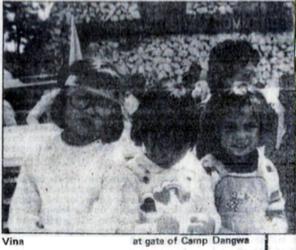
Belinda
Brooklyn, NY
Eastern Europe 1989
I was living in West Berlin (I came on a Fulbright in 1987, after graduating law school) but spending a lot of time in East Berlin helping a dissident group (a number of the members also became good friends). I was also doing some journalism and acting as a fixer for journalists, so I saw a lot, both before and after November 1989. I traveled through Poland and Hungary in summer of 1989, interviewing dissidents, and was in East Berlin for the big demonstrations and events in October. On Nov. 9, when the Wall opened up, I was in East Berlin. I stayed in Berlin until 1994 and saw how the hopes of the original dissidents in some ways were not fulfilled, though their lives certainly improved.
Of course the contexts are quite different, though some things are very familiar - the process of overcoming fear and realizing lots of people think the same way you do, the euphoria, the pent-up expression that comes out in everyone talking and talking. Just from my observations, i guess the main thing is that the sense of unified purpose and the euphoric hopes that accompany revolutions cannot last, and some disappointment is inevitable. People will disagree on what they actually want, the unity will disintegrate, reality will set in and set parameters. That's not necessarily a bad thing, but it does bring a certain amount of disappointment, and that psychological element is important to anticipate and deal with. Also, people who have been living in a dictatorship for generations really do have to learn how to live with democratic institutions - it doesn't happen overnight.
The Round Tables that were held in Poland, then in E. Germany and most of the Eastern European countries, with opposition and government officials negotiating the transition over a period of months, could be a model for the Egyptians - they are kind of a visible representation of change, but give the transition some time. Finally, a big issue that I haven't seen discussed too much in the Egyptian context is the issue of transitional justice - how do you deal with collaborators with and members of the previous regime. In East Germany, there was the whole question of the secret police files and the border guard trials; Czechoslovakia had its lustration issues. How that is dealt with can create serious tensions in society, no matter how you deal with it, and that will surely come up. There is a lot of experience on that out there, though, if the Egyptians want to take advantage of it.
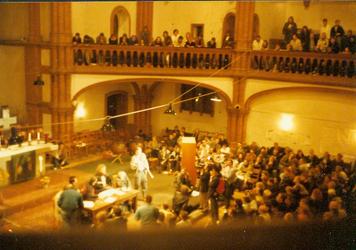
MARY ALICE McCULLOUGH CESARD
PARAMUS, N.J.
Other/Almost
MY GRANDMOTHER, LILY KEMPSON, JOINED THE OTHER YOUNG PEOPLE IN DUBLIN, EASTER MONDAY,1916, WHO ROSE UP AGAINST THE BRITISH OCCUPATION,WHILE THEY WERE BUSY WITH WW I IN EUROPE.
THEY HELD THE POST OFFICE AND DECLARED THE IRISH REPUBLIC. AFTER A WEEK THE CENTER OF DUBLIN WAS DESTROYED AND TAKEN BACK BY THE BRITS.
THE MEN INVOLVED WERE HUNG AND THE WOMAN WERE EXILED.
MY G-MA CAME TO AMERICA AND LIVED FOR 80 MORE YEARS.
THE REPUBLIC SAW LIFE 5 YEARS LATER, IN 1922---BUT THE BRITISH STILL HOLD THE NORTH ( 6 PROVINCES)
ACCORING TO THE GOOD FRIDAY ACCORDS THE WHOLE OF IRELAND WILL VOTE ONE DAY---LIKE THE SUDAN--- AND CHOOSE TO HAVE THE BRITSLEAVE AND TO RE-UNITE THE NORTH TO THE REPUBLIC.
REVOLUTION LEADS TO VIOLENCE AND BLOOD SHED BUT IT IS WORTH IT . THE NEXT GENERATIONS WILL PROFITS FROM THE SACRIFICES OF THEIR ANCESTORS!
Yin Mei
New York
Other/Almost
I was born in China, and grew up during the Chinese Great Proletarian Cultural Revolution (1966-1976)
The experiences therein did more than shape my childhood; the Revolution still influences my life to this day. I have used my professions, choreographer and professor (I was hand-picked as a child to study the Revolutionary Model Play in China) to tell my stories. These experiences are mostly alien to those around me, but important to know, in order to understand the spectrum of humanity. Below I include some of my memories in the form of a script that was used as part of my multimedia dance performance in 1998. The witnessing of the Revolution through my experiences is not a passive act, and as such, I continue to create performances such as “Empty Tradition/City of Peonies” because it is through the arts that memory remains/becomes interactive.
EMPTY TRADITION/CITY OF PEONIES
Copyright 1998 Peter L. Critchell and Yin Mei
PROLOGUE
ACCORDING TO LEGEND,
THE EMPRESS TOOK A WALK ONE WINTER DAY
IN HER SNOW-COVERED GARDEN
AND HAPPENED UPON
A LONE PLUM BLOSSOM BLOOMING IN THE SNOW.
DECIDING THAT THIS WAS THE MOST
BEAUTIFUL SIGHT SHE HAD EVER SEEN,
THE EMPRESS DECREED
THAT ALL OF THE FLOWERS IN HER GARDEN
WERE TO BLOOM BY DAWN THE NEXT DAY.
THE NEXT MORNING,
EVERY FLOWER IN HER GARDEN HAD
OBEYED HER EDICT – SAVE ONE.
ALONE AMONG ALL THE FLOWERS,
THE PEONY REFUSED TO BLOOM.
TO PUNISH THIS REBELLIOUSNESS,
THE EMPRESS DECREED
THAT EVERY PEONY IN THE LAND
WOULD HENCEFORTH BE BANISHED
TO A CITY DEEP IN THE COUNTRY’S INTERIOR,
THE “CITY OF PEONIES.”
[PAUSE]
A THOUSAND YEARS LATER,
THERE WAS A TIME WHEN
PEONIES WERE FORBIDDEN TO BE GROWN
EVEN IN THE “CITY OF PEONIES.”
AND IN THAT TIME,
I DREAMED THAT I COULD FLY AWAY
CARRYING ALL THE PEONIES WITH ME,
CARRYING ALL THE PEONIES IN MY ARMS.
I
Bedtime Stories
WHEN I WAS A CHILD,
THERE WERE NO BEDTIME STORIES.
I WANDERED THE DARK IN SEARCH OF DREAMS;
IN THE DAY
I DID NOT KNOW WHAT NOT TO BELIEVE.
II
The Red Book
WHEN I WAS A CHILD,
I LOVED THE SMELL OF BOOKS.
WHEN I GOT MY HANDS ON A BOOK,
I WOULD CRACK THE SPINE,
PUT MY NOSE INTO THE BINDING
AND INHALE FOREVER.
WHEN I WAS NINE,
EVERY BOOK SUDDENLY TURNED RED.
A HUNDRED MILLION RED BOOKS
WITH EXACTLY THE SAME WORDS
ON EACH WHITE PAGE.
A HUNDRED MILLION HANDS HELD
THOSE RED BOOKS HIGH,
LIKE A HUNDRED MILLION PEONIES
ON FIRE.
THAT IS WHEN I FIRST WANTED TO DANCE:
I WANTED TO DANCE
ON THOSE BOOKS.
III
A Broken Voice
WHEN I WAS A CHILD,
I WAS TERRIFIED TO SPEAK
BECAUSE OF THIS BROKEN VOICE OF MINE.
“IT’S A BAD OMEN,’ THEY SAID.
DO YOU HEAR WHAT I MEAN?
I BELIEVED THEM.
I BELIEVED SO MUCH I WANTED TO DIE
BECAUSE OF THIS VOICE.
IV
My Brother
WHEN I WAS A CHILD,
MY BROTHER WAS MY SHADOW,
AND I HIS.
[PAUSE]
I WANTED MY BROTHER TO DIE.
I WANTED MY BROTHER TO DIE
A GLORIOUS, HEROIC DEATH –
A DEATH SO SPLENDID
IT COULD EXONERATE HIM
OF THE CRIME OF
BEING BORN WHITE AS THE WHITEST FLOWER,
AND REPLACE THE SHAME WE SHARED
WITH THE PLEASURE OF REVENGE.
WHEREVER WE WENT,
THEY STARED, AND POINTED, AND LAUGHED,
“THERE GOES THE WHITE BOY,” THEY SAID.
“HE’S LOST HIS WAY IN THE SNOW,” THEY SAID.
“HEAVEN HAS EYES,” THEY SAID.
“IT’S A PUNISHMENT ON HIS FAMILY,” THEY SAID.
IN THE “CITY OF PEONIES,”
IT WAS ONLY IN THE DARK
THAT WE COULD PASS UNNOTICED.
I WAS NOT AFRAID OF THE DARK;
THE DARK WAS MY LOVER.
I WAS AFRAID OF THE DAY.
V
The Wall
WHEN I WAS A CHILD,
WE LIVED OUR LIVES ENTIRELY INSIDE
THE FOUR WALLS OF OUR INSTITUTE’S COMPOUND.
THERE WERE GUARDS AT THE GATE
TO STOP PEOPLE COMING IN
AND TO MAKE A LIST OF WHO WENT OUT.
EVERYONE I KNEW LIVED INSIDE WALLS.
IF YOU LIVED OUTSIDE WALLS,
YOUR EXISTENCE COULD NOT BE IMAGINED.
YET BECAUSE OF MY BROTHER,
A PART OF ME LIVED OUTSIDE THE WALLS,
KIN WITH EVERYTHING
THAT THE PEOPLE INSIDE THE WALLS
WANTED TO KEEP OUT.
[PAUSE]
I CARRY A WALL INSIDE ME, NOW,
AND I STOP PEOPLE COMING IN,
AND I KEEP A LIST OF WHO GOES OUT.
[PAUSE]
IT IS GETTING HARDER
TO TELL THE DIFFERENCE BETWEEN
THE EMPTINESS THAT IS WITHIN
AND THE EMPTINESS WITHOUT.
VI
Soldier
WHEN I WAS A CHILD,
I DREAMED I WOULD LOVE A SOLDIER.
I WOULD LOVE A SOLDIER
BECAUSE SOLDIERS ARE NEVER WRONG,
BECAUSE SOLDIERS NEVER LEAVE,
BECAUSE SOLDIERS HAVE NO GRIEF.
I WOULD LOVE A SOLDIER
BECAUSE SOLDIERS ARE OUR ONLY HEROES.
VII
Hero Of The Revolution
WHEN I WAS A CHILD,
THEY CLOSED OUR SCHOOL AND
SENT OUR TEACHERS AWAY.
OUR NEW SCHOOL WAS A FACTORY,
OUR NEW TEACHERS WERE FACTORY WORKERS.
WE DID NOT HAVE TO READ BOOKS
AS OUR FINAL EXAM,
WE HAD TO START A GENERATOR.
ANYONE WHO STARTED THE GENERATOR
GOT AN “A.”
I GOT AN “A,”
NOT BECAUSE I STARTED THE GENERATOR,
BUT BECAUSE I YANKED THE
STARTER ROPE SO HARD
I LOST MY BALANCE
AND SLAMMED, LIP-FIRST,
ONTO THE ENGINE HOUSING.
I GOT AN “A” FOR EFFORT.
MY LIPS WERE SWOLLEN FOR DAYS,
AND I DROOLED WHEN I SPOKE.
BUT NOT ONE CHILD LAUGHED.
I WAS A HERO OF THE REVOLUTION.
VIII
The Surgeon
WHEN I WAS A CHILD,
I BECAME AN EXPERT AT KILLING
THE CHICKENS AND FROGS AND OTHER ANIMALS WE ATE.
SO TALENTED WAS I THAT MY PARENTS SAID
I WOULD GROW UP TO BE A SURGEON.
ONE DAY, A NEIGHBOR BOY,
A RED GUARD,
WAS ACCOSTED BY A RIVAL GROUP,
WHO TOOK HIM DOWN INTO A BASEMENT,
TIED HIM UP ON AN IRON BED,
AND BEAT HIM TO DEATH WITH STICKS.
BY THE TIME THEY FINISHED,
HIS KNEECAPS HAD DISAPPEARED.
IN THE DREAMS THAT COME BEFORE I SLEEP,
I SEE HIM,
COVERED WITH BLOOD –
MUTILATED IN HIS PRIVATES.
I NEVER DID BECOME A SURGEON.
IX
The Kite
WHEN I WAS A CHILD,
I DREAMED THAT I COULD FLY.
ONE DAY,
I TOOK MY KITE TO THE ROOF OF OUR BUILDING
AND RAN ALONG THE EDGES,
CIRCLING AND CIRCLING
TO CATCH THE WIND THAT RISES ABOVE THE WALLS.
BEFORE I KNEW IT,
I HAD TAKEN A STEP TOO FAR
AND FLOWN MYSELF RIGHT OFF
INTO THE EMPTY AIR,
FIVE STORIES TO THE GROUND.
I BROKE A LEG, BUT I SURVIVED.
I WAS FAMOUS AFTER THAT.
THEY CALLED ME “THE PILOT.”
Uncertainty and insecurity go hand in hand with revolution. Never knowing what tomorrow may bring, and whether your choice will be the right one- these are often life and death decisions with reasons or answers often too big or too complex to comprehend, at least at the time. Revolution is not one man’s intention- it is a creature with its own momentum, its own forces well beyond one’s control. Take care of yourself and your family each day, follow the dictates of basic fundamental human kindness, beyond religion, and beyond politics and cultural divides. Especially, take care of your children. A child needs to grow up in a world with answers, not a world where no one knows what tomorrow will bring.
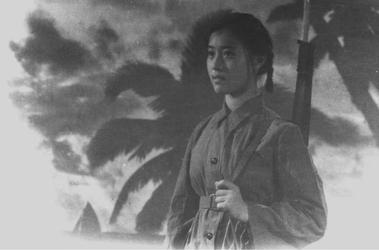
Paula
NYC
Other/Almost
In Nov. 1973 I was on a one week vacation to Athens, that included air fare, hotel and some meals. When we arrived at the airport we were told we could change money and then get on the bus to the hotel. Immediately after we were told to get right on the bus. Those who didn't, spent the night at the airport, as there was a curfew. We didn't get our luggage, but some people didn't get a room as the group that was supposed to leave when we arrived were barred from leaving due to the curfew.
The following morning we were taken out sightseeing and had to be in by 1 due to the curfew. In the center of town there was a sudden commotion and a male journalist came running out of a hotel asking us what happened.
As the days progressed, we were given later curfews. When we left and I arrived home 3 in the morning and went to slept. When I awoke and turned on the radio I heard there was a take over in Greece and a total curfew.
Other/Almost
Paris 1968. I was a student, living with a French family that participated. Educational experience, to say the least.
Too much to say in this small space. . . .
Suggested reading and pictures, linked from Wikipedia page for May 1968 in France:
http://www.martinfrost.ws/htmlfiles/paris_1968.html
Some lessons I learned:
--Results are often the opposite of what was most desired.
--Better results come from years of good planning, organization, and solidarity.
--Personalities and those with savvy will hijack the mission; troublemakers will come out for the simple pleasure of wreaking havoc. And watch out for 'agents provacateurs'. Everyone will trot our their own grievance points. Muddle.
--Always stock up on supplies because there will be shortages.
--Innocent people get killed, wounded, arrested. Out-of-control mess.
--Have several contingency plans: where to go if you can't get home, how to stay in touch, where to hide incriminating evidence, how not to provoke violence against yourself, etc.
j p mcgeary
chatham nj
Other/Almost
My grand father was a commando (group)
leader during the Rand Revolt in South Africa during 1922. The revolt started as a strike by miners against the rich mine owners but when the government came in on the side of the owners they needed to use tanks , airplanes and soldiers to regain control of the goldmining towns around Johannesburg. Though my grandfather's part was small in comparison to others, he was arrested, charged with high treason and served time in jail.
Money is power. Governments often act badly towards their own citizens.
I accidently discovered the information about my grandfather's role in a book about the Rand revolt by Jeremy Krikler entitled White Rising...
Goto Google books for photos
Acela
New York
Phillipines 1986
When I was in college, I participated in the People Power movement that caused the downfall of Ferdinand Marcos in the Philippines almost 25 years ago. It was days of marching in the streets and sleeping on the pavement. The latter was to guard a tv station which was broadcasting to the public where to go and how to help and participate. I was there when the Marcoses left and the marchers took over the Presidential Palace.
It helps a lot if the opposition has its forces behind a leader who can replace the deposed leader. In our case, the widow of an opposing figure who Marcos had assassinated. The tricky thing is to not have the revolution railroaded by opportunists who are out to grab power.

